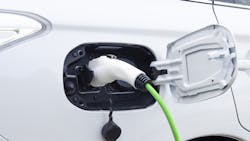SiC Fits into the Future of Renewable Energy, DC Fast Chargers
This article is part of the TechXchange: Silicon Carbide (SiC).
While it’s emerging as one of the key building blocks for electric vehicles (EVs), silicon carbide (SiC) is also now playing a pivotal role in renewable energy and infrastructure that must evolve to enable a more sustainable future.
onsemi signed a supply agreement with Kempower for SiC MOSFETs and other chips from its EliteSiC family, which will factor into the company’s future EV fast chargers. In addition, it’s supplying SiC power devices to Sineng Electric for a new series of industrial-grade solar inverters.
Because it belongs to a class of wide-bandgap semiconductors, SiC can more efficiently distribute and convert power at the high voltage levels that have been the domain of silicon IGBTs for years.
One of SiC’s most valuable properties is that it can handle 10X higher breakdown voltages than silicon. That helps reduce the on-resistance (RDS(on)) between the drain and source regions of the power FET when turned on, keeping conduction losses in the device to a minimum.
Since SiC supports 2X more electron saturation velocity than silicon, these chips are also suited for high switching frequencies. With its minimal gate and output capacitance, SiC power devices tend to lose less power to switching transients, opening the door to faster switching. Furthermore, higher frequencies enable the use of smaller magnetics and passives in a given power stage, driving up power density.
These characteristics limit the current that leaks out of the SiC power FET when it’s turned off, improving efficiency when applied to power systems that can supply tens of thousands of watts.
On top of that, power FETs based on SiC can better tolerate heat that can sap the performance of a system due to their higher junction temperature. These chips are relatively easy to cool as well, given the higher thermal conductivity of SiC power FETs compared to IGBTs.
Converting Power with SiC
Under the first of the new agreements, onsemi is supplying Kempower with its new M3S family of high-voltage EliteSiC MOSFETs for EV chargers. The SiC-based D3 diode is part of package, too.
The devices will apply to the active ac-dc front end and primary and secondary dc-dc conversion stages in Kempower’s cloud-connected dc fast chargers, which are said to be modular and scalable.
The SiC products will help enable dynamic load balancing. During operation, the charger intelligently adapts how much power it draws from the electric grid to optimally distribute power to cars, trucks, and other EVs.
The new M3S 1,200-V SiC MOSFETs are designed to facilitate higher switching speeds required by electric-grid equipment such as EV chargers, solar, and energy-storage systems.
A series of automotive-grade power MOSFETs are also part of the M3S family. Targeted at bus voltages of up to 800 V, the 1,200-V devices are tailored for high- to low-voltage dc-dc converters that need a high figure of merit when it comes to switching loss. In addition, the chips can support up to 22-kW onboard chargers (OBCs) that convert ac from the electric grid to dc to recharge the battery pack under the hood of the EV.
The new power MOSFETs will also be available as half-bridge power integrated modules (PIMs) in industry-standard F2 packages that further reduce RDS(on), suiting them for heavy-duty industrial power units.
The modules are integrated with direct-bonded copper designs to enable balanced current sharing and thermal distribution between parallel FETs in EV chargers and uninterruptible power supplies (UPS).
With a maximum voltage rating of 1,200 V in TO-247-2 or TO-247-3 packages, the D3 diode taps into the power-handing properties of SiC to better withstand heat. It also features a reduction in series-resistance temperature dependency, suiting it for the power-factor-correction (PFC) stages in a power supply or for output rectification, in which an ac voltage source is converted into a constant-current dc voltage supply.
Raising the Bar for Renewables
In another agreement, onsemi will supply its SiC MOSFETs to Sineng Electric. They will be integrated into Sineng’s latest “utility-scale” solar inverter, targeted at utilities that are investing more in renewable-powered grids.
Unlike central inverters, which are attached to separate solar panels to optimize the output of each one, Sineng’s string inverters convert the high-voltage dc pumped out by a series of several solar panels into usable three-phase ac that can be transferred over the grid to support various loads.
The company is also using one of onsemi’s IGBT-based, single-stage PIMs in a multilevel topology for a 200-kW energy-storage system that saves surplus power and doles it out over the grid when the sun stops shining. In this case, a bidirectional inverter is used to form the interface between the ac or dc power from the renewable-energy source and the battery storage system.
The fan-cooled system from Sineng can handle dc voltages of up to 1,500 V and currents of 224.5 A, with up to 98.8% efficiency. Each cluster of battery cells inside the unit can be discharged and charged independently.
The latest deals are only one facet of the company’s ambitions in silicon carbide, as demand for power MOSFETs and other chips based on the new semiconductor material is rising by roughly 30% a year.
onsemi has signed supply agreements with several major automakers, including BMW, Kia, Mercedes-Benz, and Volkswagen. They’re all looking to leverage SiC MOSFETs in future EV models.
To help stay a step ahead of demand from different corners of the power electronics market, the company said last month that it’s reviewing whether to invest $2 billion to increase its SiC output.
Read more articles in the TechXchange: Silicon Carbide (SiC).
About the Author
James Morra
Senior Editor
James Morra is the senior editor for Electronic Design, covering the semiconductor industry and new technology trends, with a focus on power electronics and power management. He also reports on the business behind electrical engineering, including the electronics supply chain. He joined Electronic Design in 2015 and is based in Chicago, Illinois.


